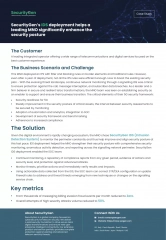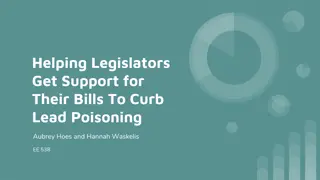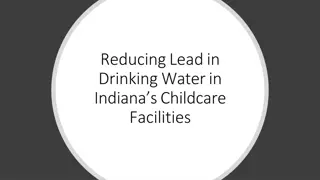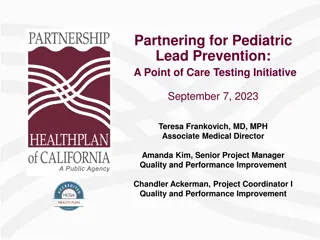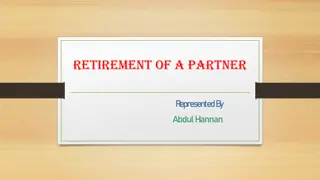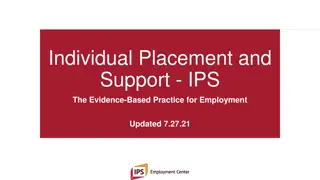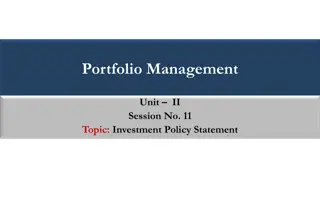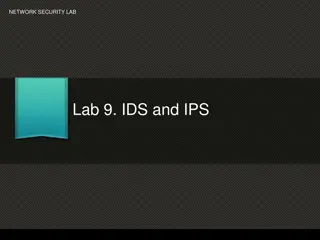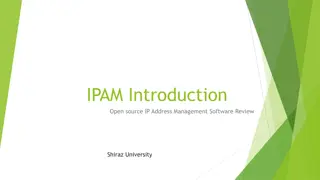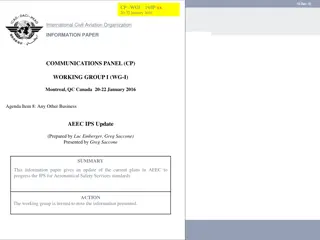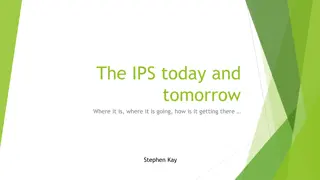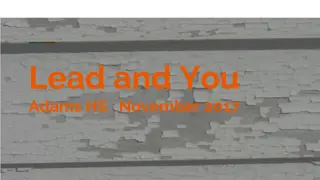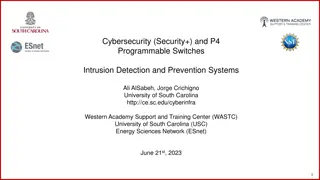
IPS Transformation Model: Indianapolis Public Schools Overview and Data Comparison
Explore the Internal Lead Partner Proposal for Indianapolis Public Schools, including the Department of Innovation & Transformation, academic division, and district comparison data with Guilford County Schools. Gain insights into the IPS transformation model, implementation data, and graduation rates for a comprehensive view of educational improvements.
Download Presentation

Please find below an Image/Link to download the presentation.
The content on the website is provided AS IS for your information and personal use only. It may not be sold, licensed, or shared on other websites without obtaining consent from the author. If you encounter any issues during the download, it is possible that the publisher has removed the file from their server.
You are allowed to download the files provided on this website for personal or commercial use, subject to the condition that they are used lawfully. All files are the property of their respective owners.
The content on the website is provided AS IS for your information and personal use only. It may not be sold, licensed, or shared on other websites without obtaining consent from the author.
E N D
Presentation Transcript
INTERNAL LEAD PARTNER PROPOSAL Indianapolis Public Schools Dr. Lewis D. Ferebee, Superintendent State Board of Education May 14, 2014
Overview 3 Indianapolis Public Schools (IPS) Transformation Internal Lead Partner (ILP) Department of Innovation & Transformation Comparison & Implementation Data IPS Transformation Model
Overview 4 IPS Model/8 Step Crosswalk IPS Model/Lead Partner Comparison IPS Model Investment & Expansion Costs Scope of Work IPS Monitoring Updates Appendix
IPS Transformation Academic Division 5 Created Department of Innovation & Transformation Hired Created IPS Transformation Model Transformational Leader
ILP Department of Innovation & Transformation 6 Deliver consistent instructional message Build internal capacity of educators Increase sustainability Reduce cost by utilizing existing district resources
District Comparison Data 7 Guilford County Schools 126 Schools 72,388 Students 59.41% Free/Reduced Lunch GCS Enrichment Region 9 Schools 6,226 Students 86.81 % Free/Reduced Lunch Indianapolis Public Schools 60 Schools 30,000 Students 77% Free/Reduced Lunch IPS Priority Schools 11 Schools 5,949 Students 83.2% Free/Reduced Lunch
Implementation Data 8 Guilford County Schools Enrichment Region Overall Composites % 2008 2009 2009 2010 2010 2011 2011 - 2012 Overall Improvement Elementary School 53.4 57.3 41.4 Middle School 54.9 57.6 60.2 High School 52.1 57.5 57.7 Bessemer Montlieu Wiley 51.0 40.1 40.1 60.3 60.7 52.0 56.3 72.1 70.7 5.3 32.0 30.6 Hairston Jackson Welborn 43.9 48.9 57.1 51.2 56.7 64.7 55.6 59.5 66.1 11.7 10.6 9.0 Andrews Dudley Smith 47.5 41.6 41.2 57.8 60.3 54.9 64.6 63.6 68.4 17.1 22.0 27.2
Implementation Data 9 Guilford County Schools Enrichment Region Graduation Rate (%) 2008 2009 2009 2010 2010 2011 2011 - 2012 2012 - 2013 Overall Improvement High School 80.1 80.8 81.2 80.7 Andrews Dudley Smith Enrichment Region 66.8 78.2 73.3 73.7 77.0 81.0 80.1 79.6 87.6 85.6 84.5 85.8 86.9 86.1 74.0 81.9 20.1 7.9 0.7 8.2
IPS Priority School Selection 10 Washington Irving 14 Joyce Kilmer 69 Elder W. Diggs 42 George H. Fisher 93 Riverside 44 Francis Scott Key 103 James Russell Lowell 51 Northwest Jr. HS 625 Ralph Waldo Emerson 58 John Marshall Jr. HS 626 Clarence Farrington 61 Schools selected were labeled an F in 2012 & 2013 with negative or no growth within the A-F model.
IPS Transformation Model 11 Recruitment/Hiring Central Services School-based Staffing Instructional Framework Professional Learning Communities (PLC) Formative Assessment Professional Learning Supplemental Instructional Time/Opportunities Instructional & Support Strategies Student Behavior Model Staff Morale Culturally Responsive Climate Weekly Monthly Quarterly Monitoring Systems
IPS Transformation Model 12 Staffing 2 English Language Arts (ELA) Coaches 2 Math Coaches Central Services Graduation Coach Math Coach ELA Coach School-based
IPS Transformation Model 13 Instructional & Support StrategiesFramework Instructional Framework Mastery Learning Training Professional Learning Communities Protocols Formative Assessment Development & Usage Training Foundational & Content Specific Coaching Framework Leadership Excellence Professional Learning
IPS Transformation Model 14 Climate Student Behavior National Model Selection Training & Implementation Climate Survey Creation Survey Results Usage Staff Morale Culturally Responsive Training & Implementation
IPS Transformation Model 15 Monitoring Systems Common Walkthrough Document PLC Protocol Coach Support Weekly Culturally Responsive Benchmarks Revised Pacing Instructional Audit Formative Assessments Corrective Instruction Plans SIP/SAP Reviews Quarterly
Turnaround Principles/ IPS Model 16 Turnaround Principles Safe school environment with family and community engagement Rigorous, aligned and responsive instruction Effective leaders and teachers Increased time for teaching and learning Use of data for continuous improvement IPS Transformation Model Creating revised pacing to include strategic and corrective instruction Recruitment of highly effective central office and building leaders Building in enrichment and intervention instructional time Offering multiple opportunities for formative assessments Facilitating usage of national behavior model Providing instructional support for usage of data within classroom setting Hiring instructional coaches to scaffold teacher effectiveness Providing professional development and a systemic instructional framework Promoting culturally responsive goal setting and benchmarks for success Providing afterschool and supplemental learning opportunities Source: U.S. Department of Education- School Turnaround Overview 2011
ILP & ELP Common Practices 17 Scholastic Develop School Leaders TNTP IPS Voyager
IPS Model / 8 Step Crosswalk 18 IPS Transformation Model The 8-Step Process Staffing District Coaches Building Coaches Step 1 - Data Disaggregation Step 2 - Instructional Calendars Step 3 - Instructional Focus Instructional & Support Strategies Mastery Learning PLC Training & Protocols Strategic Professional Development Step 1 - Data Disaggregation Step 2 - Instructional Calendars Step 3 - Instructional Focus Step 5 - Tutorials Step 6 - Enrichment
IPS Model / 8 Step Crosswalk 19 IPS Transformation Model The 8-Step Process Climate National Behavior Model Climate Survey Step 1 - Data Disaggregation Step 8 - Monitoring Monitoring Systems Walkthrough Documents Instructional Audit PLC Protocols Coach Support Culturally Responsive Benchmarks Quarterly Formative Assessments Step 1 - Data Disaggregation Step 2 - Instructional Calendars Step 3 - Instructional Focus Step 4 - Assessment Step 7 - Maintenance Step 8 - Monitoring
IPS Model/Lead Partner Comparison 20 Feature IPS TNTP Voyager Scholastic Rise Training (Administration) X X Gradual Release Model X X Online Tools X X PLC Training X X Leadership Training X X X X Year Long PD Plan X X Instructional Coaching X X Revised Pacing X Data Analysis and Applications X X
IPS Model/Lead Partner Comparison 21 Feature IPS TNTP Voyager Scholastic Student Materials (Read 180 & Math 180) X Teacher Materials (Read 180 & Math 180) X Internal Building Coaches X Culturally Responsive Goal Setting X Diagnostic Formative Assessment X Support Instructional Leadership Team X X Assessment of School Needs X X New Teacher Support X X
IPS Model Investment 22 $97,746 Priority Elementary Principals extended to 12 months Assistant Principals for each Priority Elementary School $588,988 One 12-month High School Assistant Principal at each school $42,770 All Priority High Schools will receive a Behavior Specialist $216,492 General Fund General Fund Total: $945,996 Summer Teaching & Learning Institute $94,630 Literacy Coach Positions $818,928 Parent Involvement Educator Positions $512,809 Title I Title I Total: $1,426,367 $100,000 Year-Long Professional Development $240,000 Director & 6 Instructional Coaches $633,600 Title 2A Title 2A Total: $873,600 IPS Investment Total: $3,245,923
IPS Model Expansion Cost 23 2 ELA Coaches 2 Math Coaches District Coaches District Coaches Total: $300,000 3 Graduation Coaches 3 ELA Coaches 3 Math Coaches Building Coaches Building Coaches Total: $500,000 $100,000 Initial Support Ongoing Support Professional Development Professional Development Total: $100,000 Total: $900,000
Scope of Work 24 June-July 2014 June-September 2014 Sept. 2014-June 2015 Phase One: Foundational Support Phase Two: Initial Support Phase Three: Ongoing Support Pre-assess instructional competencies and deficits Train building level coaches on coaching cycle and instructional focuses Conduct Summer Teaching and Learning Institute Review historical data Train district coaches on coaching cycle and PLC protocols Provide content-specific training for teachers and leadership excellence sessions for principals Train district coaches on instructional framework Create framework for content- specific training Facilitate coaching support within schools Train principals and building level coaches on instructional framework Develop content for leadership excellence sessions Monitor usage of walkthrough documents Purpose Provide the support needed to assist George Washington, John Marshall, and Broad Ripple achieve academic success Develop SIP/SAP plans to include strategic instruction and climate SMART goals Conduct quarterly audits of revised pacing guide usage, corrective instruction plans, SIP/SAP plans and culturally responsive benchmarks Product Increased academic achievement
Project Plan 25 Year One: 2014-15 Timeline 2014 Descriptions Resources June Conduct instructional audit to identify instructional strengths &weaknesses trending across content areas & grade-levels Analyze the following data trends from the last three years: Graduation Rate, ECA Scores, ISTEP Results Director of Innovation & Transformation Building instructional coaches District instructional coaches School administration June 23-27 Train coaches & principals on mastery learning Conduct strategic training on instructional coaching & facilitating professional learning communities July 21-25 Train principals on mastery learning
Project Plan Continued 26 Timeline 2014-15 Descriptions Resources August September Construct a framework for content- specific training based on the beginning of year data points Support school leadership teams in crafting SIPs & SAPs that align with instruction & climate data trends Director of Innovation & Transformation Building instructional coaches District instructional coaches School administration September June Conduct embedded coaching with building coaches & teachers through PLCs & classroom support visits Quarterly Deliver leadership excellence sessions & content-specific training for teachers & school administration Analyze results of support tools & goals created by schools for improvement
Program Evaluation Continue, Expand or Sunset? Monitor & Adjust to Improve Year 1 Continuous Improvement Cycle: CIP Plan, Do, Check, Act
IPS Monitoring Updates 25 Quarterly Monthly (State Board Presentations) (Check-ups with IDOE and State Board Reports) Qualitative Data: *Overview of action steps taken *Summary of results and implications by school *SIP adjustment plans developed based upon student data results *Next steps to provide additional support and increase results Qualitative Data: *Snapshots of professional development implications *Principal and teacher performance trend data *Next steps for additional support and progress Quantitative Data: *Acuity results *Formative assessment results Quantitative Data: *Formative assessment results by school
26 Questions
Appendix 27
District Coaches 28 Facilitate monthly content specific training for building coaches Support building level coaches in developing plans for instruction Guide building level coaches in modeling/co- teaching Recommend instructional strategies for improvement
Building Coaches 29 Ensure instructional alignment Facilitate Mastery Learning Instructional Framework Develop teachers knowledge of content and best practices Facilitate professional learning community meetings
Mastery Learning Cycle 46 Indicator-Based Instruction Remediation & Enrichment Formative Assessment Formative Assessment Corrective Instruction
Strategic PD Plan 48 Mode of Support Who s Training? What? Recipe for Learner Success PLC s *Conduct Weekly PLC s in which teachers are trained and coached in the usage of three instructional focus areas. *Focus Areas: Tools of Engagement, Teacher Directed- Explicit Dialogue, Student Products *Teachers will develop lessons utilizing the recipe. *Instructional Coaches and Director will provide feedback on lesson creation and lesson delivery. *District Coaches *Building Level Coaches Applied Skills Planning Sessions *Teachers will gather the standards in which 70% or more of students were not proficient. *Teachers will select an instructional strategy to reteach each standard. *Teachers will model the teaching of the skill with the strategy during the meeting. *Instructional Coaches and teacher will give feedback to each other. *Building Level Coaches *7th/8th Grade ELA-Math Teachers will conduct a co-teaching experience with a pre-selected instructional coach. *The coach and teacher will collaborate on the instructional delivery. Co-teaching Day *Building Level Coaches
Leadership Excellence 49 Discipline with Dignity Poverty Training Culturally Responsive Education Motivation, Resilience, & Grit Cultural Relevancy Mastery Learning Gradual Release / Direct Instruction Instructional Best Practice / Balanced Literacy / PLCs Data Driven Instruction Instructional Framework Mission & Vision Communication Maximizing Resources (Financial & Human Capital) Leveraging Partner Relationships Marketing and Branding Organizational Optimization
National Behavior Model 25 Schools will follow national model to create school- wide plans Sourced from PBIS Indiana http://www.indiana.edu/~pbisin/uploads/files/77.pdf
Instructional Audit 27 Audit Focus Areas: Pedagogy *Teaching Practices Content *Facilitation of a specific subject- area DIT Coaches will conduct walkthroughs to analyze the effectiveness of teachers in each area.
Corrective Instruction Tools 28 Corrective Instruction Action Steps Step 3- Deconstruction of Standards
Assessment Calendar 41 Acuity A Acuity B Acuity C Diagnostic C Diagnostic A Diagnostic B Sep 22 Dec 1 Feb 2 Nov 3 Mar 9 Apr 13

